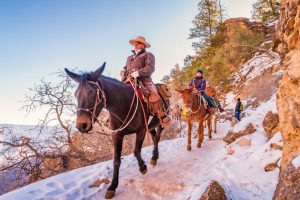
Rangers and other park staff all have a lot in common – an unwavering commitment to preserving our state and national parks and the ecosystems within them, a conservation-minded love of nature and the outdoors, and an understanding of how the big-picture approach to environmental causes has to involve teaching the public how to appreciate the wonders of nature while treating it with care and respect.
But beyond that, the field of professions involved in ensuring visitor safety and attending to parklands—and the salaries they earn—couldn’t be more varied. A lot of that has to do with the way different states and the National Park Service define the different roles, which can cover everything from park maintenance and interpretive roles, to full-on law enforcement duties that include the authority to enforce state and federal laws and make arrests. Jobs can be full-time and year-round or part-time and seasonal. And because overtime pay can be significant, particularly during the busy summer months, even seasonal work can involve earning significantly more or less in some months than in others.
Seasonal work at a small state park can pay as little as $15 an hour, while career rangers at large state and national parks can pull down salaries in the range of $80,000 a year.
Just a few of the factors that determine starting salaries for park rangers include:
- The park agency (federal or state)
- The size of the park and the scope of the job
- The park ranger position (e.g., cultural park ranger, protective park ranger)
- Education and experience
Keep reading to take a closer look at what park rangers are earning at the federal and state level and what you can do to optimize your salary potential:
Park Ranger Salary Information For Your State
Federal Park Ranger Salaries Follow the General Schedule Pay Scale
Salaries for Park Rangers with State Park Departments
Find Park Ranger Salary Info For Your State
- Alabama
- Alaska
- Arizona
- Arkansas
- California
- Colorado
- Connecticut
- Delaware
- District of Columbia
- Florida
- Georgia
- Hawaii
- Idaho
- Illinois
- Indiana
- Iowa
- Kansas
- Kentucky
- Louisiana
- Maine
- Maryland
- Massachusetts
- Michigan
- Minnesota
- Mississippi
- Missouri
- Montana
- Nebraska
- Nevada
- New Hampshire
- New Jersey
- New Mexico
- New York
- North Carolina
- North Dakota
- Ohio
- Oklahoma
- Oregon
- Pennsylvania
- Rhode Island
- South Carolina
- South Dakota
- Tennessee
- Texas
- Utah
- Vermont
- Virginia
- Washington
- West Virginia
- Wisconsin
- Wyoming
Federal Park Ranger Salaries Follow the General Schedule Pay Scale

Park rangers work to preserve, manage, and protect the federal land that falls within the auspices of the U.S. Department of the Interior (DOI)—more than 189 million acres’ worth if you’re counting.
If you’re a federal park ranger, your job duties may range from conducting public education programs to providing law enforcement and emergency services within one of the following DOI agencies:
- Bureau of Land Management
- Bureau of Reclamation
- National Park Service
- S. Fish and Wildlife Service
Some park rangers are also employed through the Army Corps of Engineers, which oversees more than 420 lakes and river projects in 43 states, as well as more than 7,700 miles of land and water trail systems. Park rangers through the Army Corps of Engineers are civilian positions and therefore do not require service in the U.S. Army.
Regardless of the agency in which you’re employed, you’ll earn a salary based on the federal General Schedule (GS) pay scale, which features 15 pay grades (GS-1 to GS-15) and ten pay steps within each grade; or otherwise the GL schedule specifically for federal law enforcement officers.
General and Interpretive Park Rangers
Specialized experience may include working as a park guide or tour leader; working in forestry or fire management in a park, recreation, or conservation area; archeological or historical preservation work; or management, assistant or program specialist work related to protection, conservation, or management of parks and similar areas.
Some of the bachelor’s and graduate degrees recognized include natural resource management, natural sciences, earth sciences, history, archeology, anthropology, park and recreation management, museum sciences, and business administration.
Current salaries (as of 2020) for park rangers, according to the GS are:
- GS-5: $30,113 – $39,149
- GS-7: $37,301 – $48,448
- GS-9: $45,627 – $59,316
- GS-11: $55,204 – $71,764
- GS-13: $78,681 – $102,288
- GS-15: $109,366 – $142,180
Though the GS schedule starts at GS-1 for candidates with no post-secondary education or experience, most park rangers are hired at GS-5 and above (according to the Park Ranger Series, 0025):
- GS-5: Requires a four-year bachelor’s degree with at least 24 semester hours of related coursework or at least one year of specialized experience equivalent to the GS-4 level.
- GS-7: Requires either one full academic year of graduate education or at least one year of specialized experience equivalent to the GS-5 level.
- GS-9: Requires either two full academic years of graduate education/master’s degree related to the occupation or at least one year of specialized experience equivalent to the GS-7 level.
- GS-11 level or above: Requires either three years of graduate level education or Ph.D. or doctoral degree related to the occupation or at least one year of specialized experience equivalent to the GS-9 (or above) level.
Law Enforcement Park Rangers
Specialized experience may include working in law enforcement or investigations.
Some of the bachelor’s and graduate degrees recognized include law enforcement/police science, social sciences, public administration, behavioral sciences, and sociology.
Law enforcement rangers working in protective and law enforcement positions are paid using the GL schedule:
- GL-5: $37,141 – $46,177
- GL-6: $39,162 – $29,233
- GL-7: $42,273 – $53,460
- GL-8: $44,064 – $56,457
- GL-9: $47,148 – $60,837
- GL-10: $51,921 – $66,996
Most of these positions require previous law enforcement and/or military training and experience and the completion of a course of training through the Park Ranger Law Enforcement Academy Training Program.
Locality Pay
You may earn more based on where your duty station is located. Locality pay tables for specific geographic locations ensure park rangers are earning more in places with higher costs of living.
For example, park rangers in the Washington D.C./Arlington, VA/Baltimore MD metro area earn between $39,291 – $51,082 at the GS-5 level – about $10,000 more annually than the national GS-5 pay range of $30,113 – $39,149.
Federal Benefits
Park rangers within the DOI enjoy outstanding federal benefits and perks that can significantly increase their overall salary package:
- Health Benefits: Federal employees enjoy the widest selection of health plans in the country.
- Flexible Spending Accounts: The Federal Flexible Spending Account (FSAFEDS) program offers three different flexible spending accounts: A health care flexible spending account, a limited expense health care flexible spending account, and a dependent care flexible spending account.
- Dental and Vision Insurance: The Federal Dental and Vision Program (FEDVIP) includes four nationwide and three regional dental plans and three nationwide vision plans.
- Life Insurance: The Federal Employees Group Life Insurance (FEGLI) offers basic life insurance coverage and three forms of optional life insurance coverage.
- Long-term Care Insurance: Helps pay for the costs associated with long-term care services in the home, in a nursing home or assisted living facility, or in other settings.
- Retirement Benefits: The Federal Employees Retirement System (FERS) is a three-tiered retirement plan consisting of FERS Pension, Social Security benefits, and the Thrift Savings Plan.
What Rangers in Different Federal Agencies are Earning
Current job openings provide a closer look into what federal park rangers are earning and where:
- Park Ranger, National Park Service, Tutuila Island, American Samoa
- Starting at $52,905 (GS-9)
- Park Ranger, U.S. Fish and Wildlife Service, Multiple locations
- Starting at $46,499 (GS-7)
- Park Ranger, U.S. Army Corps of Engineers, multiple locations
- Starting at $27,800 (GS 3-5)
- Park Ranger, Bureau of Land Management, multiple locations
- Starting at $34,916 (GS 5-7)
- Supervisory Park Ranger, National Park Service, San Francisco, CA
- Starting at $111,286 (GS-13)
- Supervisory Park Ranger, National Park Service, Grand Canyon, AZ
- Starting at $76,721 (GS-12)
- Supervisory Park Ranger, National Park Service, Washington D.C.
- Starting at $76,721 (GS-11)
- Park Ranger (Paramedic), National Park Service, Yosemite National Park, CA
- Starting at $43,251 (GS 7-9)
- Supervisory Park Ranger Protection, National Park Service, Oneida, TN
- Starting at $64,000 (GS-11)
- Supervisory Park Ranger (Interpretation), National Park Service, Concord, MA
- Starting at $85,428 (GS-12)
- Supervisory Park Ranger (Chief of Interpretation, Education & Visitor Services), National Park Service, Springdale, UT
- Starting at $91,231 (GS-13)
Salaries for Park Rangers with State Park Departments

To a far greater degree than federal park rangers, salaries for park rangers working for state parks departments can and do vary widely based on education, experience, and job description, not to mention different budgetary considerations in different states. In places where parks are big business, driving tourism and large scale local use and supporting both state revenue and local businesses, states have no problem finding the money to pay generous salaries. That’s not always the case in places where state parks land on the expense side of the ledger when hashing out how tax dollars should be spent.
For example, state park peace officers (rangers) with the California Department of Parks and Recreation earn between $47,772 and $76,236 per year, while those in supervisory ranger positions earn between $63,132 and $85,800 per year.
To qualify for a California ranger position, you must have at least 69 semester college units, including 21 general education units in the natural/social sciences, language, humanities, and mathematics, and at least three years of experience in a park ranger cadet or visitor services/resource management/interpretation/parks operations position. You’ll also need to graduate from a POST basic course academy.
In other states, salaries follow a pretty similar schedule, with entry level interpretive positions requiring a couple years of college, and higher ranking positions in law enforcement showing preference to candidates with a bachelor’s degree and some law enforcement experience.
Park rangers working for Washington State Parks earn within these ranges:
- Park Ranger I: $41,352 – $55,524
- Park Ranger II: $46,644 – $62,748
- Park Ranger III: $55,524 – $74,604
- Park Ranger IV: $69,264 – $93,132
Even candidates for the Park Ranger I position must have at least two years of college and must be at least 21 years old.
Oklahoma’s park rangers through the Oklahoma Department of Tourism and Recreation earn the following:
- Park Ranger Level I: $22,844 – $33,504
- Park Ranger Level II: $25,128 – $36,854
- Park Ranger Level III: $27,827 – $40,813
- Park Ranger Level IV: $36,784 – $53,949
In Virginia, park rangers (called natural resource specialists and managers) working for the Virginia Department of Conservation and Recreation earn salaries that fall within these ranges:
- Natural Resource Specialist II: $27,004 – $70,017
- Natural Resource Specialist III: $35,278 – $87,831
- Natural Resource Manager I: $35,278 – $87,831
- Natural Resource Manager II: $46,087 – $111,012
- Natural Resource Manager III: $60,209 – $141,502
Locality pay comes into play even with state parks departments. Natural resource managers working in Northern Virginia, for example, earn more than their counterparts in other parts of the state due to a higher cost of living there that bumps the salary range to $27,004 – $88,884.

